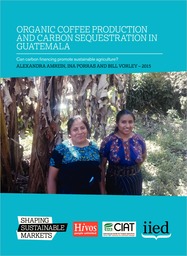Organic coffee production and carbon sequestration in Guatemala: can carbon financing promote sustainable agriculture?
In Guatemala, we study a coffee project claiming carbon credits through its organic practices. Compared to conventional large-scale coffee production, the organic practices of smallholder farmers in the north of Guatemala provide a number of environmental benefits, including capturing and storing carbon dioxide in biomass and soil. The Educational Corporation for Costa Rican Development (CEDECO) has created the CamBio2 methodology to quantify the land’s carbon stock and issue carbon credits. The project provides a good illustration of the potential of combining organic coffee in smallholder production with carbon markets. However, the costs involved in developing these markets are still too high, given the uncertainty of payments. How can future revenues be used to promote organic agriculture beyond the pilot project? This case study forms part of the Hivos-IIED Payments for Ecosystem Services for Smallholder Agriculture series, exploring the potential of carbon offset funding in relation to smallholder agriculture.

